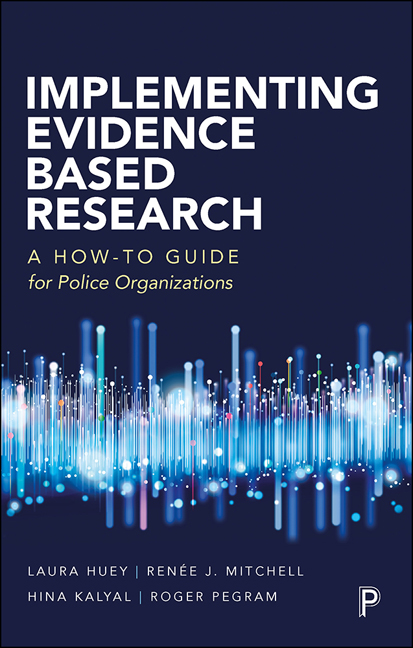Book contents
- Frontmatter
- Contents
- List of tables and figures
- Acknowledgments
- Introduction
- 1 Implementing evidence-based policing
- 2 Situating evidence-based policing
- 3 Understanding research
- 4 The individual approach
- 5 The smaller agency
- 6 The mid-sized agency
- 7 The larger agency
- 8 Generating sustainability
- 9 Resources for evidence-based practices
- Endnotes
- References
- Index
9 - Resources for evidence-based practices
Published online by Cambridge University Press: 05 January 2022
- Frontmatter
- Contents
- List of tables and figures
- Acknowledgments
- Introduction
- 1 Implementing evidence-based policing
- 2 Situating evidence-based policing
- 3 Understanding research
- 4 The individual approach
- 5 The smaller agency
- 6 The mid-sized agency
- 7 The larger agency
- 8 Generating sustainability
- 9 Resources for evidence-based practices
- Endnotes
- References
- Index
Summary
Throughout this book we have looked at how to get started learning about evidence-based policing (EBP), whether you are an individual looking to educate yourself on the topic or a leader in a large organization attempting to shift cultural values, using agency size as a framework. Although we have used agency size as a framework, some large agencies (Chapter 7) might find solutions in the chapter on small agencies (Chapter 5) useful, and vice versa. That being the case, we thought a chapter dedicated entirely to useful evidence-based resources might be a handy go-to guide, no matter the size of the agency.
This chapter is broken down into various EBP Societies, policing organizations, and universities that have dedicated their resources to sharing evidence-based information.
We begin with the most obvious resources, the Societies of Evidence-Based Policing, and review some of what each of the Societies offers for their members.
Evidence-Based Policing Societies
UK Society of Evidence Based Policing (SEBP)
The first Society of Evidence Based Policing (SEBP) was formed in the UK, which is why their name and website does not indicate a country. At the time it was established, there were no similar societies. Because other countries soon followed suit and created similar societies, SEBP is referred to in the literature and in conferences as the UK Society of Evidence Based Policing, but on its website (see www.sebp.police.uk), its official name is the Society of Evidence Based Policing. It was founded in 2010 and is open ‘to any member of police staff or researcher who is committed to making a positive impact in the community through using the best available research evidence’, and is ‘made up of police officers, police staff and research professionals who aim to make evidence based methodology part of everyday policing in the UK’ (www.sebp.police.uk). You do not have to be a British citizen to be a member, and membership is free.
The goals of SEBP are:
• To increase the use of best available research evidence to solve police problems.
• To produce new research evidence by police practitioners and researchers.
• To communicate research evidence to police practitioners and the public.
- Type
- Chapter
- Information
- Implementing Evidence Based ResearchA How-to Guide for Police Organizations, pp. 177 - 192Publisher: Bristol University PressPrint publication year: 2021

